Improving Durham’s Health One Phone Call at a Time
February 24, 2022
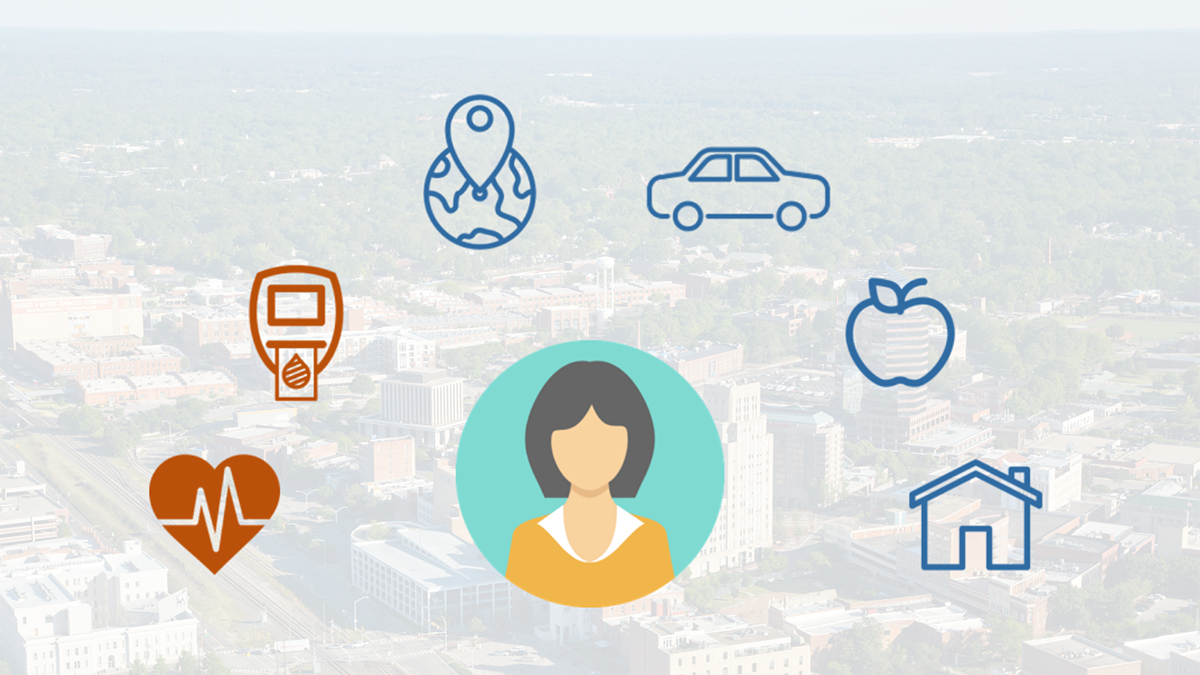
By Milena Ozernova ’22
Meet “Maria,” a Durham resident. Maria has uncontrolled diabetes and hypertension. But a combination of social factors makes it particularly difficult for her to manage her chronic conditions. As an immigrant who doesn’t speak much English yet, Maria has trouble navigating the health system. Without a car, she can’t get to her doctor’s appointments. She can’t afford to buy a lot of fruits and vegetables. Without stable housing, she has a hard time taking her medication. All these factors together create a great deal of stress in Maria’s life, which has negative impacts on her mental and physical health.
As a result of systemic inequality and poverty, millions of people like Maria are grappling with poor health outcomes that have little or nothing to do with their individual choices. Over 80% of health outcomes in the U.S. are directly linked to the social determinants of health, such as economic stability, education, food, neighborhood and physical environment, yet there are few initiatives that help patients meet their social needs and improve integrated care.
How It All Started
Launched in 2018 with support from a Bass Connections Student Research Award, the Help Desk project aimed to address social determinants of health in Durham. Janet Bettger, ScD, FAHA, associate professor of orthopaedic surgery, served as faculty mentor. Student founders Sahil Sandhu ’20, Lillian Blanchard ’19, Jackie Xu ’19 and Veronica Sotelo Muñoz MPP ’19 recruited a team of undergraduates and graduate students to train volunteers to connect patients from Lincoln Community Health Center with social services and community resources. The longer-term goal of the initiative was to improve patient health outcomes.
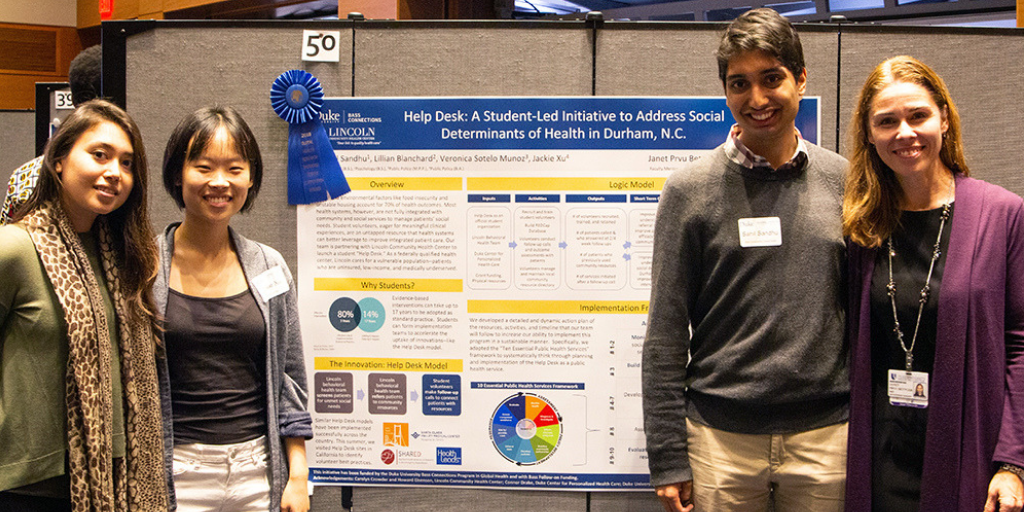
Since then, Help Desk has evolved to become a large-scale student-run initiative that encompasses three healthcare facilities, 16 faculty and healthcare leaders and advisors, three program coordinators, dozens of student members and over a thousand available resources.
A multiyear Bass Connections project ran through May 2021. The work continues, with new partners Duke Pediatrics Primary Care and Duke Emergency Department in addition to Lincoln Community Health Center.
Scaling the Help Desk Initiative

Duke junior Grace Lee joined Help Desk as a volunteer in the summer after her freshman year. Her main responsibilities were to call patients to discuss their resource referrals and help them overcome barriers in accessing them.
“I still remember one specific patient that was telling me about her granddaughter’s TikTok project,” Grace said with a smile. “I love having these conversations with patients. I feel like I really get to know them, know their lives and their stories. These are definitely my best experiences — I love Help Desk so much, both in terms of what I’ve experienced and what it can do for the community.”
At its conception, Help Desk was designed to follow up with patients and assist them in connecting to the resources they had received from the case managers at Lincoln. As students started scaling the program, the Help Desk model began to include screening, referral and follow-up, and the workflow continues to improve to accommodate for new patient needs and social circumstances, most of which are pandemic-related.
This summer, students screened and referred over 100 patients, and volunteers continue their work at Lincoln during the school year.
“We’re scaling the program, so [Dr. Bettger] talked to us about making Help Desk a system-wide program through Duke Health, which is a little bit scary to think about, but again, super exciting!” said Grace.
Last semester, Grace was promoted to become one of Help Desk’s three program coordinators. Even though juggling Help Desk responsibilities and Duke’s demanding schoolwork presented many challenges, Grace found her experience to be rewarding both professionally and personally.
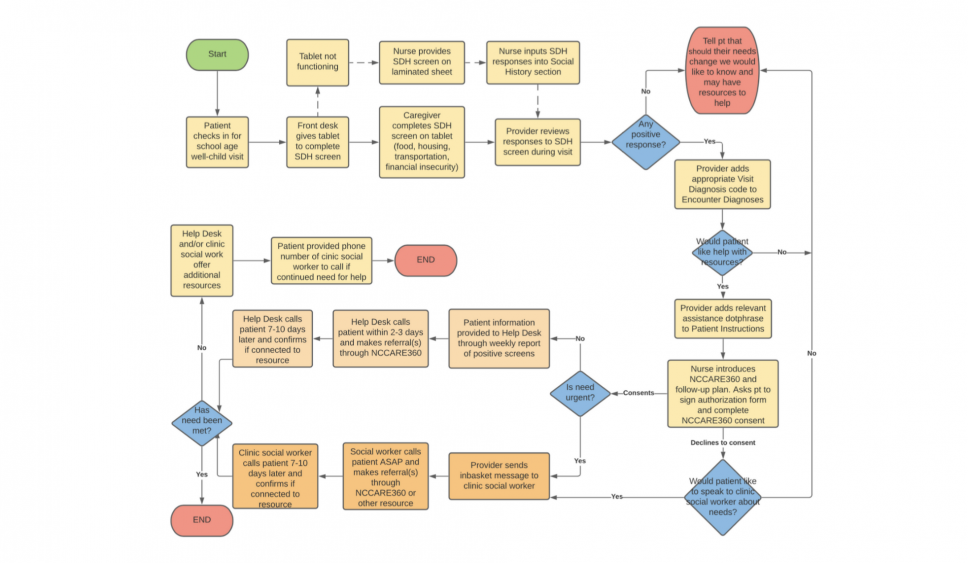
“Help Desk became the biggest part of my college career,” Grace said. “I’ve learned so much about how to stay organized, to be better at time management and communicate with different groups of people. The program transformed my college experience.”
Grace came to Duke primarily interested in neuroscience, but after learning more about health policy and working with pediatric patients through Help Desk, she is now pursuing a Child Research Policy Certificate to better understand child and family policy issues. Grace believes that the main lessons she learned at Help Desk are to take initiative and be more proactive in everything she does.
Working With Vulnerable Patients
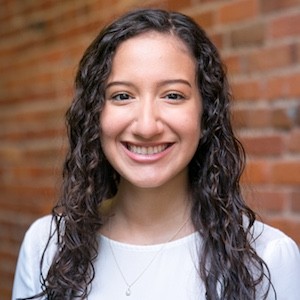
Before moving into the position of a program coordinator like Grace, Duke senior Natalie Rincon joined the Help Desk project as a volunteer back in 2020. For eight months, Natalie’s job was to call patients who had been screened at Lincoln, an experience she found surprisingly rewarding.
“My focus was on Spanish-speaking patients, a lot of whom were immigrants or undocumented,” Natalie said. “This is the population that usually gets left behind when we talk about helping a community with social needs.”
Natalie always had an interest in health equity, particularly for patients who are racial and ethnic minorities. Given that the patient population that Help Desk focuses on is low-income and largely consist of racial and ethnic minorities who were most at risk of contracting Covid, Natalie was eager to help.
“I discovered that this is the patient population I want to continue working with and that I want to eventually work in community health,” Natalie shared. “I learned a lot about the healthcare system, and by talking to patients about their non-explicitly-medical needs, I’ve gotten a bigger picture of what health actually is, and all the different factors that are at play.”
Some of the patients that Natalie worked with were undocumented immigrants, so they didn’t have access to health insurance. Some were living with other people because they couldn’t afford a home of their own. Some were in chronic pain but couldn’t go to a doctor. Others faced language barriers as they tried calling their doctor over and over again, without an interpreter to assist them.
Natalie explained that these patients could not get the medical attention they deserved and faced an increased demand for social and community resources as a result of the pandemic.
“A lot of the time, I heard the anguish that these patients were experiencing, and I’ve heard adults crying over the phone because they were under so much stress,” Natalie said. “It was an extremely difficult position to be in, even though we were trying to do as much as we could to help them. Being able to actually have patients open up to you, trust you with the information that they shared… I felt very grateful to be in this position to help them. It was an amazing experience.”

Natalie believes Help Desk is the most meaningful thing she has done in her Duke career, and has especially valued the collaboration with all kinds of people — Duke students, researchers, faculty, doctors, medical officers, social workers, healthcare professionals.
“We all bring different perspectives to the table,” Natalie noted. “These people have a lot more experience than we do, so it’s really powerful for undergrads to understand that even though we don’t have any formal medical training, we do have the ability to help people by listening to them and being there for them.”
Preparing a New Generation of Conscious Healthcare Professionals

Katherine Kutzer ’21 joined Help Desk as a volunteer when she was a junior and then transitioned to a program coordinator role during her senior year. For Katherine, being one of the two coordinators of the Help Desk program became almost as demanding as a full-time job.
“When I was leading the program, I spent a significant amount of time on Help Desk,” she recalled. Katherine spent most of her time writing reports to analyze all aspects of the Help Desk program, such as how many patients called, what resources they connected to and how many of their needs were resolved.
As an undergraduate, Katherine would also have monthly meetings with the administrators at the partnering healthcare sites to facilitate the workflow and tailor the program to their particular needs.
“I worked full-time over the summer to develop a training program, and recruit and mentor volunteers,” Katherine added. “It takes 25 hours to train each person, so it’s very intensive. We were able to standardize the training to track how well volunteers are doing and make sure they’re ready to talk to patients. It is definitely a privilege to talk to these people, and you have to go in as prepared as possible to serve them with your best foot forward.”
Speaking with patients and establishing meaningful connections with individuals helped Katherine understand the type of doctor she wanted to become and what kind of career she wanted. She credits Help Desk with making her even more motivated to study medicine and become a doctor.
“The work we’ve done has prepared me to be a culturally competent doctor — someone who’s actively seeking ways to broaden my perspective about the communities I seek to work with,” Katherine explained.
As a Help Desk volunteer, Katherine learned to approach every patient with no assumptions and an open mind. She realized how important it was to listen and demonstrate empathy to better understand and serve patients’ needs.
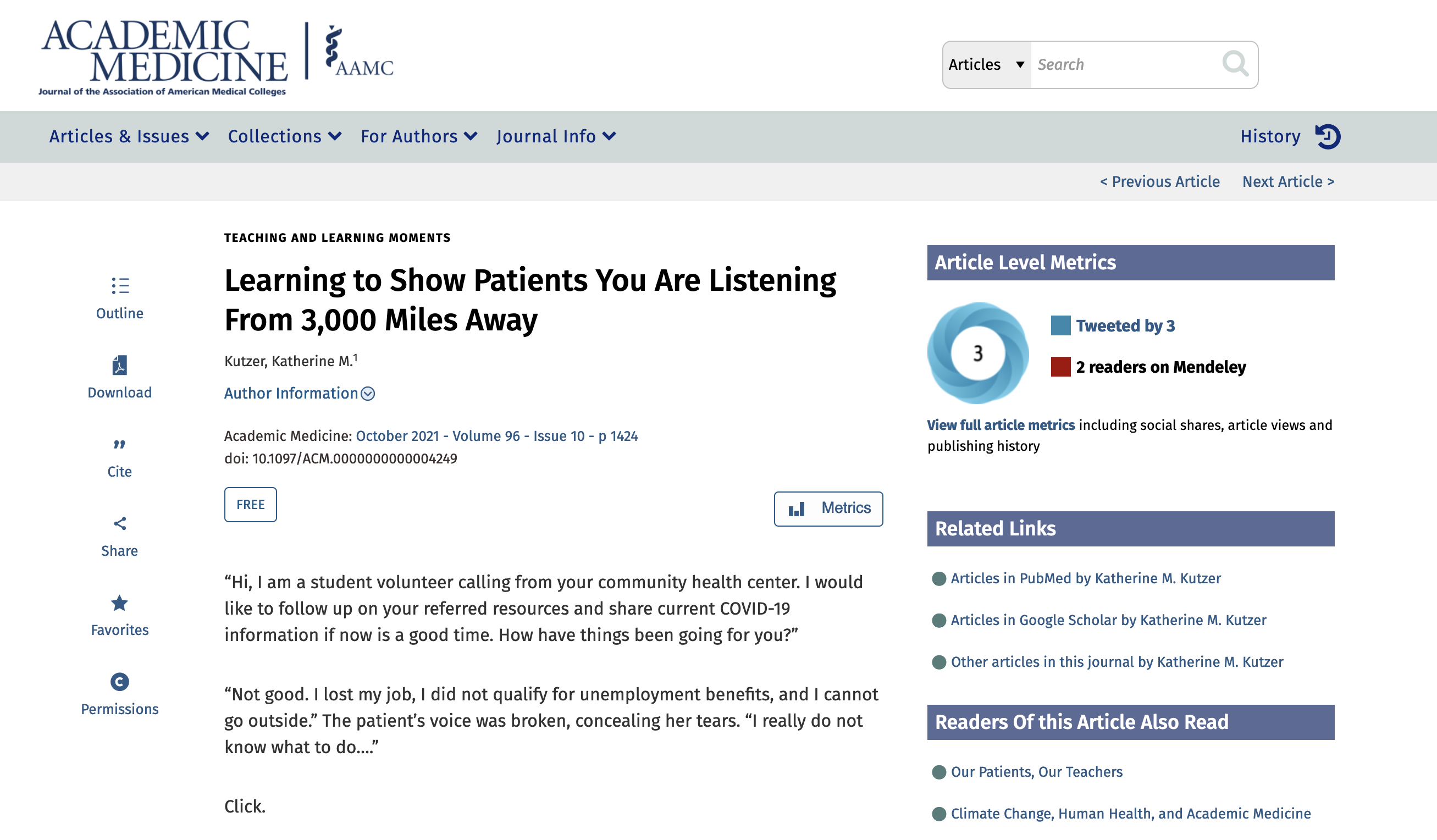
In 2021, Katherine published a paper for Academic Medicine Journal that described the most important moment of her Help Desk journey. In the wake of the pandemic, Duke’s campus shut down and Katherine had to fly back home to California. Despite being miles away from Durham, Katherine prioritized her Help Desk responsibilities and made sure that volunteers were still calling patients during one of the most vulnerable times in their lives. The article traced Katherine’s experience working with distressed patients, from losing her confidence to eventually learning how to connect with patients and find solutions tailored to each specific person.
“I realized that a lot of times when you’re talking to patients, you can’t help them with any of their basic needs, let alone their medical needs, if you don’t first address their emotions and recognize the person behind the phone,” Katherine said.
Since the day it was founded in 2018, Help Desk has become a crucial part of the Duke and Durham community that now connects dozens of students, faculty members, healthcare professionals and patients. Not only does Help Desk support patients to overcome barriers and meet their social needs, it also prepares a new generation of conscious and empathetic healthcare professionals who can actively listen and better serve their patients.
In a recent video by SAGE Publishing, Help Desk co-founder and Fulbright scholar Sahil Sandhu discussed the impact of Bass Connections on his academic and professional career.
Duke University senior Milena Ozernova is a Bass Connections communications assistant majoring in Political Science. Milena loves to travel around the world, write articles on the issues that matter to her and the student community, and take photographs of street cats.
Learn More
- Read more about the project team and its work throughout the years.
- Apply for a student research grant by by March 5.
- See current projects in the Bass Connections Global Health theme.
